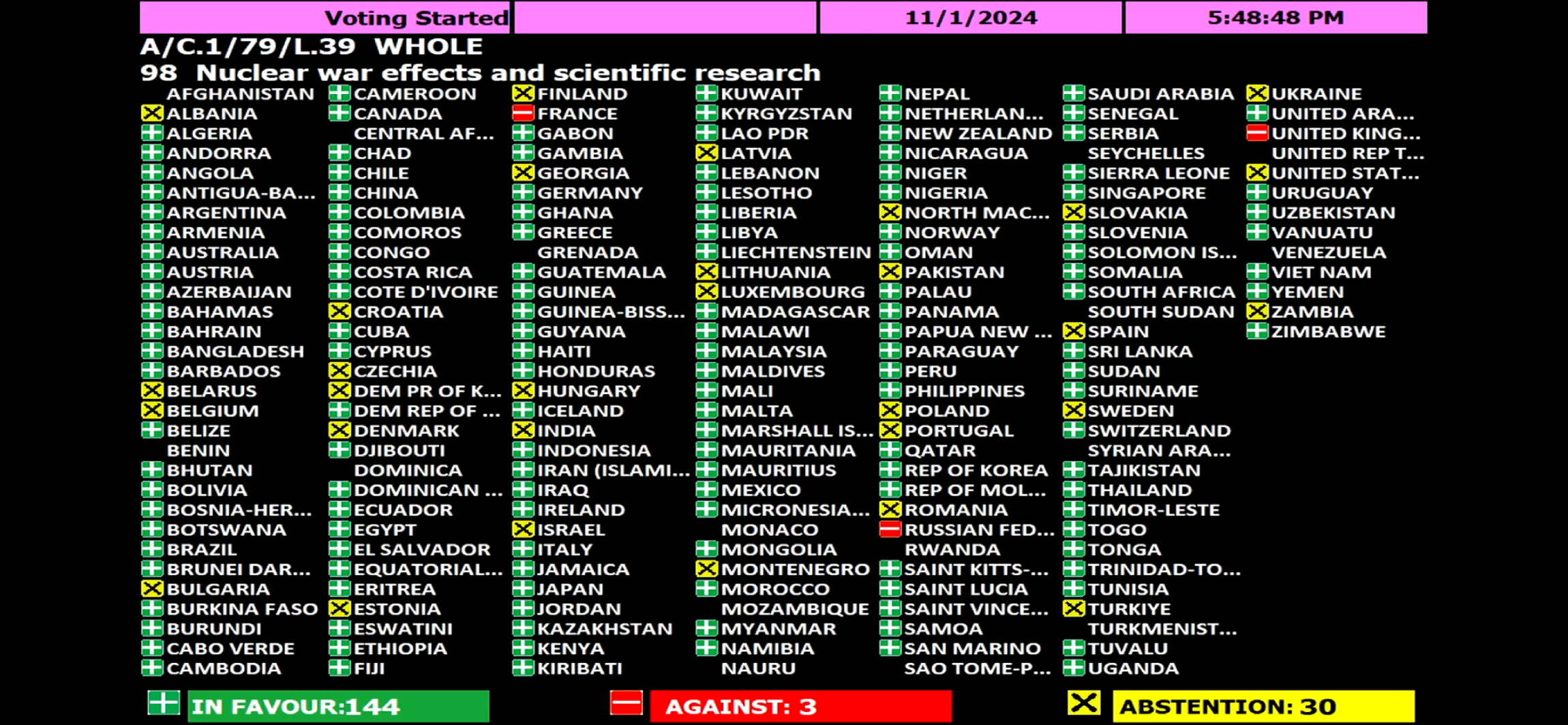On Friday 1 November 2024 the UN General Assembly First Committee on Disarmament and International Security overwhelming supported a resolution that SGS helped initiate and develop mandating an international scientific study of the effects of nuclear war.
The resolution Nuclear War Effects and Scientific Research introduced by Ireland and New Zealand had 48 co-sponsoring countries, spanning Africa, Asia, Latin America, Europe and the Pacific. A total of 144 countries voted in favor, and 3 countries voted against. In December, the resolution will go for a vote at the full United Nations General Assembly.
The resolution calls for establishing a 21 person scientific panel to be appointed by the UN Secretary-General and charged with “examining the physical effects and societal consequences of a nuclear war on a local, regional and planetary scale, including, inter alia, the climatic, environmental and radiological effects, and their impacts on public health, global socioeconomic systems, agriculture and ecosystems, in the days, weeks and decades following a nuclear war.” The panel also is tasked to make key conclusions and identify areas requiring future research.
The resolution calls upon the panel to consult with the widest range of scientists and experts and for the United Nations system and relevant agencies to support the work of the panel, including by contributing expertise, commissioned studies, data and papers. The panel will report to the UN General Assembly in 2027.
SGS organized a special event at the United Nations on 9 October 2024 in support of the resolution. The expert panel on ‘nuclear war impacts and the role of the scientific community’ was cosponsored by SGS together with the United Nations Office for Disarmament Affairs, and the UN missions of Ireland and New Zealand. The expert presenters were Zia Mian and Sébastien Philippe from SGS, Lili Xia of Rutgers University, and Neta Crawford of Oxford University. The UN Under-Secretary-General and High Representative for Disarmament Affairs, Izumi Nakamitsu, delivered opening remarks in support of the proposal. The ambassadors of Ireland and New Zealand also made statements.
The background to the resolution, the case for it, and the issues involved are available in the articles Nuclear War Effects and Scientific Research: Time for a 21st Century UN Study and We Need a U.N. Study of the Effects of Nuclear War.
Former UN Secretary-General Ban Ki-moon called on all nations to support this effort. Pugwash (the international scientists group which received the 1995 Nobel Peace Prize) wrote strongly in support, as did the International Campaign to Abolish Nuclear Weapons (Nobel Peace Prize 2017).
Led by Zia Mian, SGS has been working since 2015 to get a UN General Assembly resolution to set up an international scientific study of the consequences of nuclear war for people and planet. The last such UN study was established by a UN resolution in 1985, and published in 1988.
A parallel SGS effort launched in 2014 and led by Frank von Hippel aimed to get the US Congress to mandate a study of nuclear winter by the US National Academy of Sciences. In 2020 Congress agreed, and the National Academy of Sciences Independent Study on Potential Environmental Effects of Nuclear War is underway. The last such National Academy of Sciences study was in the 1980s.
